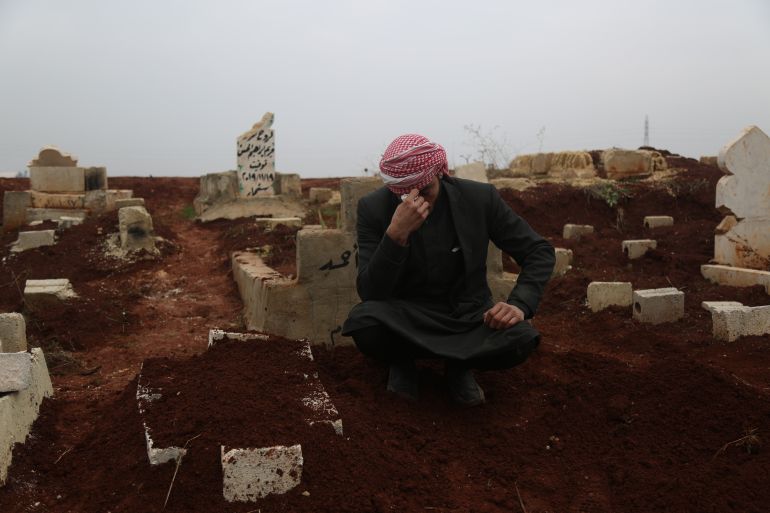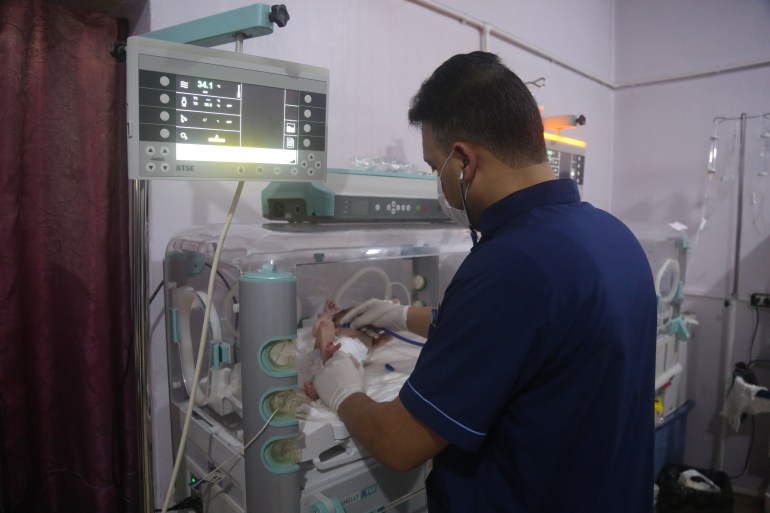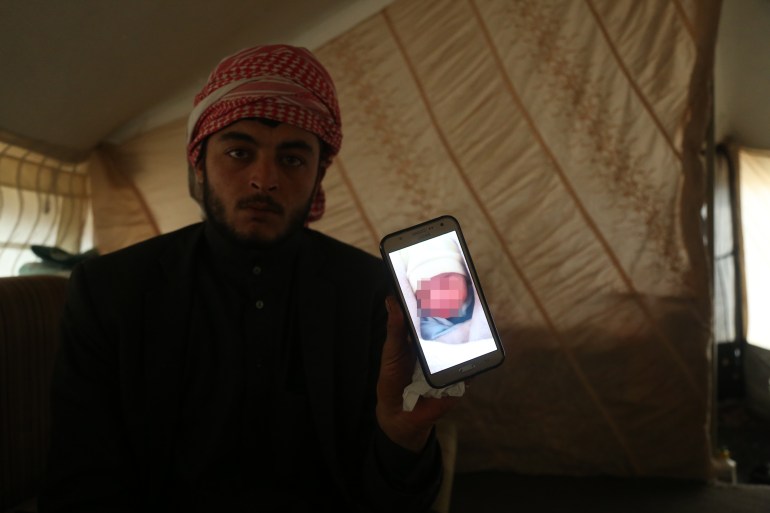Two babies freeze to death in IDP camps in Syria’s Idlib
Freezing cold weather over the past two weeks has swept Idlib, home to almost two million displaced Syrians.

Two children died overnight, including a seven-day-old baby, in tented displacement camps in Syria’s Idlib province due to severe cold weather, drawing attention to the dire humanitarian condition in the region.
“When I touched her, she felt like ice,” Mohamad Al-Hassan told Al Jazeera. His seven-day-old daughter Fatima passed away overnight at the Al Rahman hospital in Idlib, which is home to millions of Syrians who have fled the decade-old war.
Keep reading
list of 3 itemsLimbless Syrian boy in iconic photo starts new life in Italy
SDF commandos close in on Syria prison, capture ISIL fighters
“We were able to prepare a little bit for the winter,” said Al-Hassan, “but we couldn’t get everything we need. It’s hard to secure work and an income.”
His family was displaced seven years ago from southern Aleppo province, before moving to the Laith displacement camp further north where they have since lived in tented settlements.
Dr Fadi Hallak of the Al-Rahman hospital said that Fatima was blue and bleeding from the nose and mouth by the time she reached the hospital. “She was born here a week ago without any complications,” Hallak told Al Jazeera. “But she, unfortunately, died because of the freezing cold in recent days.”

Freezing cold weather over the past two weeks has swept northwest Syria, where more than 4 million displaced Syrians live. About 1.7 million of these internally displaced persons (IDPs) live in tented settlements after fleeing the forces of President Bashar al-Assad. The enclave is the last opposition stronghold in the war-torn country.
Amina Salameh, a two-month-old who lived with her family in the Al-Jabal displacement camp in northern Idlib, also passed away this morning. She had a pulse when she arrived at Al-Rahman, but doctors couldn’t keep her alive.
“She was blue and had a slow pulse,” said Dr Hallak. “We tried to keep her warm and nourish her”.
At least three other children have died in the cold in the past two weeks.
‘Avoidable and tragic’
International humanitarian agency Save the Children in a statement called the deaths “avoidable and tragic”.
“It is incomprehensible that any child should face the winter scared for their life,” Sonia Khush, the director of the Save the Children Syria Response Office, said in a statement.
“Almost 11 years after the crisis in Syria started, it feels like the world has forgotten about children in North West Syria.”
Living conditions in Idlib continue to worsen, with 97 percent of the population living in extreme poverty, and 80 percent relying on food assistance daily, according to the United Nations. The situation has since worsened due to the Turkish lira crisis and donor fatigue.
Opposition-held Northwest Syria, which adopted the Turkish currency more than a year ago, was also impacted by the Turkish currency’s spiralling devaluation since last November. Prices of food, medicine, fuel, and basic supplies have since skyrocketed.
Just 45 percent of the UN’s funding appeal for $4bn was funded for 2021, Mark Cutts, UN deputy regional humanitarian coordinator for the Syria crisis, told Al Jazeera.

Dr Hallak says the hospital is receiving a growing number of children falling ill because of the bad weather and living conditions. He says children’s wards and nurseries at hospitals are now overcrowded.
“We’re seeing many cases of bronchitis and lung damage among children, and the nursery at the hospital is overcrowded,” Dr Hallak said. “We ask organisations to urgently provide us with financial support because there are simply no vacancies for children anymore.”
The uprising-turned-war in Syria has killed close to half a million people and displaced tens of millions since it broke out in 2011.
Ali Haj Suleiman reported from Idlib, Syria. Kareem Chehayeb reported from Beirut, Lebanon.